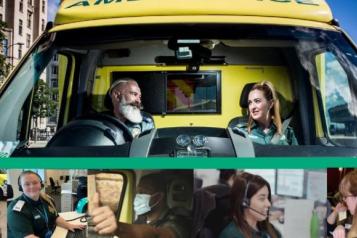Our position on patient transport

While most people can independently manage journeys to and from healthcare appointments, some need additional support. These people are often older, disabled or living with a long-term condition.
If this group are left without support, they may miss vital appointments or be left stuck at hospital, and their conditions can get worse.
What we're calling for
To try and help improve the situation we’ve called for:
- The NHS to always ask about transport support following hospital discharge, so people recovering from treatment have a way to get home.
- Ensure nobody is discharged from hospital at night unless transport can be arranged, so that patients aren’t stranded.
- A review of the NHS Non-Emergency Patient Transport Services (NEPTS) national eligibility criteria, so that people with long-term conditions who are eligible can consistently use this vital service to get to recurring hospital appointments.
- Improvements to the Healthcare Travel Cost Scheme (HTCS), so that those who need financial support to access appointments are aware of this benefit and can be reimbursed as quickly as possible.
Our evidence
Nine out of ten people told us getting to and from health services was important
In 2019, the Healthwatch network engaged with over 30,000 people about how they want the NHS to improve in their area. Nine out of ten people told us that getting to and from health services was important.
We followed this up with a briefing focused on people’s experiences of getting to and from appointments at hospitals, GP surgeries and other NHS services. The findings were based on:
- 5,221 responses to a national survey
- 773 people’s experiences of travelling to appointments shared with Healthwatch England from 2017-2019
- Analysis of local Healthwatch reports covering over 2,000 people’s experiences
- Freedom of information data from 61 CCGs on the use of NEPTS
- Reports from our partners Age UK and Kidney Care UK
The challenges of different modes of transport
For each mode of transport, people shared the challenges they face:
- Driving – availability and cost of parking
- Public transport – variation and reliability of services and additional strain of planning routes
- Taxis – unsustainable costs
- Volunteer and community transport – high demand for services
- NEPTS – vague eligibility criteria, an inconsistent appeals process and poor experiences of the service
Getting home from hospital during the pandemic
We also researched people’s experience of leaving hospital during COVID-19. One of the key issues raised by the 590 respondents was long delays leaving hospital because of the wait for transport arrangements or not having these discussed at all.
- Only 47% were asked if they needed support getting home
- This was worse when discharged at night, with 64% not being asked about transport
How well are services working together?
We contributed to developing NHS England’s national and local ‘Integration Index’. With local Healthwatch, we developed a methodology for partners to use ‘health and care experience profiles’ to understand how integrated services work together. As part of our engagement, people with multiple conditions noted making multiple trips to hospital, when appointments for each condition could be scheduled for the same day.
We also completed an internal review of feedback from carers accompanying people with dementia to medical appointments. We heard reports of carers not being allowed to travel with their loved ones, leading to distress and isolation for individuals with dementia.
Our work
Following our patient transport briefing, a formal review into NEPTS was announced by then NHS England Chief Executive Sir Simon Stevens at the 2019 Healthwatch National Conference.
We continued to share evidence with the NHS at every stage of this review, to improve understanding around the barriers people face and suggest policy solutions.
NHS England published this review in 2021, announcing:
- New, clear and consistent eligibility criteria
- Improvements to the access and quick reimbursement to the HTCS
- A commitment to more comprehensive transport support for those with needs outside of NEPTS eligibility
- That integrated care systems (ICSs) will assume responsibility for NEPTS
- A commitment to 100% zero emissions journeys by 2035
Our evidence also informed the Department of Health and Social Care’s hospital discharge and community support guidance. Among updates to this guidance, there was a recommendation that hospital discharge teams should ensure there is transport for people to return home from hospital.
And following research into people’s experience of waiting for planned careand health disparities in planned care, we influenced recommendations made in NHS England’s elective care recovery plan in February 2022.
One key recommendation we made was that people’s transport costs should be covered when they are offered quicker care away from their usual hospital. Without this support, the choice to be seen quicker would be limited to those who could afford travel and accommodation.
By June 2022, 6,700 had been offered this support.


